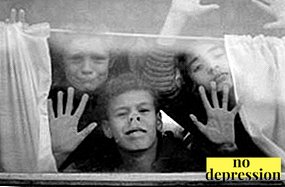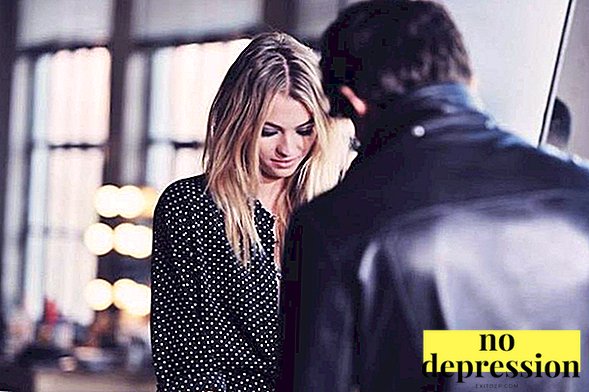In Russia and some other countries are often used the concept of "Russophobia". However, the authors using this term usually do not explain: “Russophobia” - what is it?
Is it ideology, worldview, mental illness (most of the numerous “phobias” are mental abnormalities)? Let's try to figure it out.
Concept definition

What does Russophobia mean? "Phobias" psychologists, psychiatrists, sociologists, educators, cultural scientists call unsubstantiated irrational fears.
Thus, “arachnophobia” is an inexplicable panic condition that covers a person at the sight of a spider, a tiny insect that poses no real danger.
The main essential features of all phobias:
- a person is afraid of something (or someone) that (or who) is actually not dangerous;
- a negative emotional state embraces the patient besides his will, he is unable to control himself;
- the condition of the patient is unpleasant or even painful for him;
- the pathological condition does not pass without special treatment, its causes are not recognized by the patient himself.
Most phobias are involved psychiatrists.
However, there are those that do not belong to the field of psychiatry, although the essence of any phobia (irrational fear of the fact that does not really pose a danger) is present in them. Including, this is xenophobia.
Xenophobia - fear of alien, not like sick people. They may differ in skin color, religion, sexual orientation, adhere to other cultural values and norms (to be representatives of a different culture or some kind of subculture) - it does not matter.
These are all types of xenophobia. Xenophobia can manifest itself in aggressive behavior, but this is not necessary and does not constitute the essence of this pathology.
Russophobia - This is a variation, a special case of xenophobia.
If we call xenophobe anyone who fears people who are different from him, then Russophobe is the one who is afraid of Russians.
Russophobe is afraid of Russians not because they caused him real harm. If this is so (real harm takes place), it is not a phobia, but a completely rational fear.
Russophobe does not control his emotional state, he is not able to understand himself: absolutely all Russians seem to him dangerous, hostile, aggressive.
Xenophobia - social and psychological deviation (deviation from the norm). Russophobia too. Mentally, almost all Russophobes are healthy. Their pathology is personal, mental.
However, it gives them a lot of inconvenience, and if manifested in aggressive behavioraimed at the phantom object of their fears (of all Russians) can become dangerous for other people.
Russophobes - who is it?

In 2017, the President of Ukraine, Petro Poroshenko, signed a decree, which actually banned from a certain moment to use the Russian language on the territory of Ukraine for teaching, including in elementary school.
This is typical manifestation of Russophobia and people supporting such laws can be called Russophobes. Obviously, the Russian language does not threaten Ukraine and Ukrainians. Moreover, without exception, all outstanding figures of Ukrainian culture and science of the past wrote and spoke Russian.
European culture also penetrated into Ukraine through the Russian language. This language is one of the six officially recognized international languages of UNESCO. Ukrainian and Russian are related (as are these peoples themselves).
We see here irrational fear not only not dangerous, but even useful. This is a typical phobia, and it is Russophobia.
Why are they afraid of Russians?
As in the case of any disease, body or soul, the cause of this disease is in the patient. It is with him that something is wrong, and not with the one he is afraid of.
The cause of xenophobia considered an inferiority complex. Feeling weak, defenseless in a certain way, a person finds (sometimes, in a rather random way) an external object to which he transfers his fears.
Why does the patient need it? If the fear is personalized, the patient clearly understands who he is afraid of, what kind of people are dangerous for him, he has the illusion of control of the situation.
Since I know who is dangerous for me, I can avoid meeting with these terrible people or defend myself from them, take action against them in advance.

In fact, the fight against phantoms only deepens the patient's pathological condition, since the real reason is in himself, and it is this that needs to be addressed.
Source of the disease - in the soul of the patient, and not in those whom he fears.
Bringing the problem out, the patient does not notice its true cause and is not treated, which aggravates his condition.
Currently, Russophobia is the most common in Ukraine. What is the specific reason for the prevalence of this pathology in this country?
In 2014, a revolution occurred in Ukraine. The people of Ukraine themselves called it the Revolution of Dignity. She was hard and bloody. The exact death toll has not yet been established.
According to some estimates, more than a thousand people were killed and maimed. The rebels managed to overthrow the president of Ukraine, Viktor Yanukovych, who fled to Russia. After that, other politicians came to power.
However, the situation in Ukraine not only not improved, but also worsened. Unemployment is increasing, the level of income of the population is falling. The active citizens were seized by apathy, since they see that corruption in the country is still flourishing, it even intensified after the last Maidan.
This situation caused a feeling of fatigue, powerlessness, emptiness, provoking the appearance of an inferiority complex. It may be recalled that the Maidan of 2014 was not the first. And now, after all the efforts, the result is zero.
That is why there was an unconscious psychological need project your internal problems outside yourselfas always happens with any kind of xenophobia. Russians have become such a phantom object of fear and hatred.

The cause of the country's problems is seen not in the insufficiency of the efforts made by the Ukrainians themselves, not in their mistakes, but in the Russians. That they are to blame.
Such a choice of the object of its phobia is associated with a political and even partly military conflict between Ukraine and Russia. That is, it is to some extent provoked by Russia itself.
However, at the core of their fear of the Russians, the proclamation of Russia as the main enemy of Ukraine is an irrational phenomenon.
A disease always arises because a person lacks the courage to see the problem in himself, and he transfers it to others. Russophobia in this sense is a typical example.
Is there Russophobia in Russia?
And in Russia there are russophobes? If you get acquainted with the social life of modern Russia, read the press, you can confidently answer: Yes! Russophobes a lot.
For example, publicist Boris Stomakhin, who has long been serving a sentence on a false accusation of inciting national hatred and extremism. It is constantly called "Russophobe."
Boris Stomakhin - publicist. is he did not hit anyone, did not kill, did not arrange terrorist acts. He wrote articles. Few people read these articles. The texts of Boris Stomakhin are sharply critical in relation not only to the Russian state, but also to the population of Russia.
He accuses the authorities of authoritarianism, lawlessness (the authorities confirmed the justice of the accusation, putting the author in jail, which is lawlessness), and the people - of servility, submission.

Boris Stomakhin even credited with saying that all Russians should be killed.
This is some exaggeration.
In one of his texts, he really wrote that those who took up arms in order to fight in Eastern Ukraine should be killed. But he did not call for all Russians to be killed.
Russophobes called and call many other famous people in Russia: a publicist and a satirist writer Viktor Shenderovich, musicians Yuri Shevchuk and Andrei Makarevich.
All of them are united by a very critical attitude to the Russian statehood, moral and mental qualities of the Russian people.
However, none of them have any irrational fears. They are not afraid of Russians. Moreover, Boris Stomakhin is Russian himself. He is not afraid of himself. Yes, it is impossible.
Recall that the essence of any kind of xenophobia is the transfer of the source of your fears to an external object, something distinctly different from the patient himself. Himself a patient can not be afraid. He is afraid of a stranger, some kind of dissimilar person.
In Russia, therefore, the concept of "Russophobia" is completely distorted and does not apply in the sense that it actually has. In fact, residents of Russia are called "Russophobes" everyone who is critical of their country, tells them the unpleasant truth about themselves. The term "Russophobia" does not really have such a meaning.
So, those who are called “Russophobes” in Russia are healthy, opposition-minded people with developed critical thinking. They are distinguished by a greater degree of intellectual and civic maturity than others.
Why are they called "Russophobes"? Not to take seriously what they say. BUT they say the truth and very unpleasant. But if these people are ill, then the words they utter are delusions. Why listen to them?

In fact, the sick are not those who are proclaimed “Russophobes”, but those who call them so.
This disease is infantilism, reluctance to grow up.
The ability to critically treat yourself and your country is peculiar to an adult. The attitude of the Russians (the vast majority of them) to themselves and their country is childish, immature. Therefore, the unpleasant truth causes such a reaction on their part.
In Russia phobia for criticism. It is they who are sick, and not those whom they stigmatize “Russophobes” and poison. In fact, the situation described by A.S. Griboyedov in the comedy "Woe from Wit." The most intelligent and critical declare crazy.
Are there real russophobes in Russia? Yes. They are representatives of other nations who live in Russia, but fear the Russians, although the Russians have not caused any real harm to them.
About the prevalence of phobias
It is very difficult to assess the level of prevalence of this pathology. Currently, residents suffer from it. Ukraine, Moldova, the Baltic countries, Georgia and many European countries, as well as the USA.
However, one can definitely say that in the CIS countries this is a rather massive problem (especially in Ukraine). But in Western Europe and the United States - a rarity.
Residents of Western countries rationally fear Russia and Russians, but there are grounds for that. Russia has the world's second largest nuclear potential, a huge army, and often behaves aggressively towards its neighbors. it rational concerns. Irrational fears in the Western countries are not widespread.
There is no statistics for this disease. Residents of Ukraine, where there is an epidemic of Russophobia, do not recognize themselves as sick at all. It is not possible to estimate the exact number of cases.
Household Russophobia and how to deal with it:
Treatment and prognosis
Since this pathology is a kind of xenophobia, the treatment is basically the same as with any kind of xenophobia. First of all, you need to understand your problem and recognize it.
Since the deviation is deeply personal in nature, getting rid of it against the wishes of the patient is impossible. You need to contact a psychotherapist or a psychologist. A psychiatrist will not help here.

If a the patient realized his problemHe is on the road to recovery. The doctor will hold a series of conversations, it is possible to use methods of group therapy, hypnotherapy.
The goal is to strengthen self-confidence, to overcome the inferiority complex, thereby saving the patient from phantom fears.
Although Russophobia is a disease, its aggressive manifestations may represent public dangerand we have the right to fight with them.
However, the prevention of this pathology is more effective, which is to strengthen the friendly relations between the Russian and other nations. They should be convinced that the Russians are their friends.
It is this that knocks the mail from under the feet of a delusional state that has engulfed the emotional sphere and consciousness of a person. This way and can be recommended to those who crave. to contribute to the fight against Russophobia.
On the attitude to Russia from the Western elites and most of the media:



